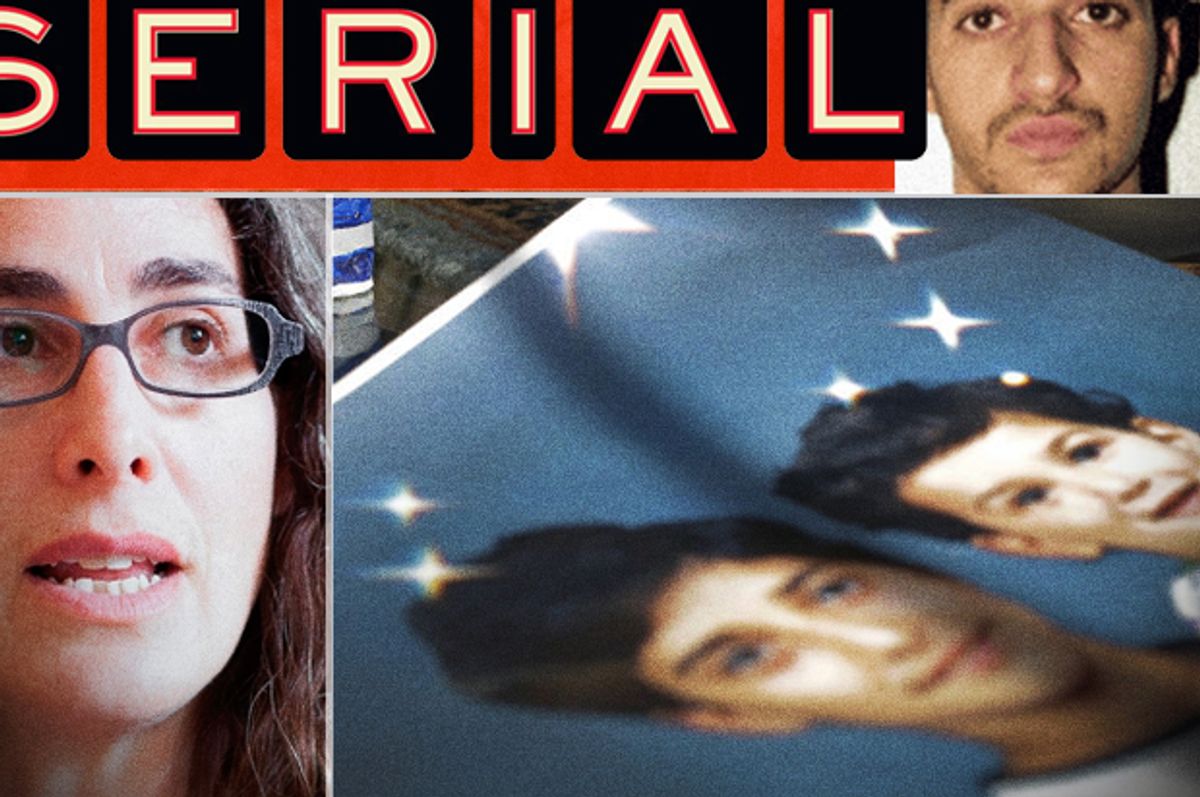If you’re a convicted killer sitting in jail with a life sentence, it’s probably natural to think it’s all over for you. But Adnan Syed, convicted of killing his ex-girlfriend Hae Min Lee in 1999, may have another lease on life. A new hearing is taking place in Baltimore, and Sarah Koenig’s “Serial,” which was downloaded something like 70 million times in its first season, is back on the case. The hearing in the Baltimore City Circuit Court could lead to a new trial for the Syed, who, like his ex, attended Woodland High School outside the city, in Baltimore County. And it comes at a good time for “Serial” as well, which has seen its following slumping a bit.
Koenig drove to Baltimore to sit in on the new hearing, which turned heavily on the appearance of Asia McClain, a friend of Syed’s who says she was discouraged from testifying in the original trial. "I felt it was the right thing to do,” McClain said of this week’s testimony. “All the information needs to be on the table in the interest of telling the truth." But "Serial" has also kept the case alive.
This is how PBS describes the back story:
Early in the season, “Serial” host Sarah Koenig interviewed Asia McClain, a woman who wrote an affidavit in 2000 establishing an alibi for Syed at the time of Lee’s murder. McClain wrote that they were in the library on Jan. 13, 1999, at the time Lee was killed. This potential alibi was given top billing as the subject of the series’ first episode. But Koenig reported that McClain never testified in Syed’s trial because his defense attorney never contacted her.
The case is incredibly complicated – involving a cellphone tower, a search warrant, time cards, multiple versions of everything, high school sex lives, and notes passed in class -- and took roughly 10 hours to describe over the show's first season, despite never quite reaching a conclusion. Some of the story has to do with Syed’s original defense attorney, Cristina Gutierrez, who Syed’s new attorney Justin Brown accuses of doing a shoddy job defending Syed and whose performance led to the Maryland Court of Appeals reconsidering the case. (Syed charged that Gutierrez was incompetent, asking for his conviction to be overturned.)
Much of this week’s hearing looked at the testimony of McClain, who wrote him letters in prison and says they were both at a library when the murder took place. “It was kind of intense,” Koenig said of McClain’s appearance, and was also struck by the fact that "Serial" was part of the testimony. Koenig – a former newspaper reporter known for her skepticism -- sounded convinced. “To just hear these things that sounded very straightforward,” she said. “It all seemed very straightforward and clear.”
Clarity aside, the prosecuting attorney tried to undercut McClain’s memory; Koenig described him as tough, going back and forth on minor things like volleyball practice.
Thursday, the hearing involved evidence that may simply be hearsay picked up by high school students. “The State thought it was being clever,” correspondent Susan Simpson reported, “and decided not to introduce anything into evidence.” So far, that’s the last we’ve heard.
"Serial’s" second season got off to a promising start in its chronicle of the strange case of Bowe Bergdahl; its bizarre interview tapes from the former soldier are chilling. But ratings and media excitement have not been nearly as strong as in season one. The podcast schedule has moved to new episodes every other week to allow time for additional reporting, with a new episode out this morning along with the shorter Syed update.
Koenig’s investigation into the Syed trial never quite took a stand on the case, but it wasn’t from lack of trying. Koenig is as dedicated a reporter as there is: Her first report this week came not from a sound booth but – for the sake of acoustics -- a hotel closet. At least two more bonus S1 installments are planned.
It’s hard to know if justice will triumph, and only a few people really know what happened. One of the themes of the show was ambiguity, the impossibility of remembering, and really knowing something for sure. “It’s like trying to plot the coordinates of someone’s dream,” Koenig said in season one. “My thoughts about Adnan’s case… have not been fixed over the course of the story,” she said near the end.
In part thanks to her and her colleagues’ reporting, and to McClain’s testimony, what really happened 16 years ago may finally reach a real conclusion.

Shares